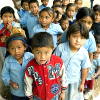
| Individual responsibility
|
We have published a trilingual multi-annual diary (in Georgian, French, and Russian) made up of:
the Charter text (in Georgian and in Russian)
photos on the theme of the environment,
proverbs, sayings, etc. (Georgian, Kurdish, Armenian, Russian, Azerbaijani, Ossetian, and Abkhazian) on responsibility, the environment, education, etc.
The diaries have been distributed to different (...) | |
|
Science Technology and Society conference
Brisbane, Australia, Dec 2009
A Science Technology and Society conference brought an opportunity to activate new contacts for the Across Oceania network by preparing a presentation for the conference and visiting an ‘ecotechnology’ scientist, Callum Coats with whom we have been associated for many years. Callum is experimenting with using energy (...) | |
|
Each passing day increases the feeling dramatically that a system of world governance is vitally needed, which respects all human beings, all that is living, and the planet as a whole. To act, we have to think, we have to make viable, applicable proposals, now. More than ever, we need to facilitate the convergence of all the thinking and the emergence of the proposals drawn from all cultures. (...) | |
|
1. Regional Media Workshop on Nonviolent Transformation:
While participating in Regional Media Workshop on Nonviolent Transformation, I shared views on Responsible media and CHR was distributed among about 40 journalists from South Asian countries.
The Group Editor of “Dainik Bhaskar”, India’s fastest growing Newspaper and group of publications in Hindi and Gujarati, with more than a million (...) | |
|
In the 2006 Report we had stated, “One of our major concerns was to avoid that work on the Charter should make sure it would not appear as an abstract philosophical theory that could only be understood by those who are accustomed to this kind of thinking. So we had to review our approach so as not to fall on discussions that only insiders would be interested (...) | |
|
Nina Gregg and Rachel Trajber took part in the November 2007 annual conference of the North American Association of Environmental Educators. The conference, which was attended by more than a thousand teachers, advocates and policy makers, offered workshops, presentations, demonstrations, scholarly papers, roundtables and strategy sessions.
Nina and Rachel led a workshop on “Using the Charter (...) | |
|
This VIDEO presents the overview of a young man’s life, a student who hates Mondays, the day when university starts again after festive weekends with the friends.
Monday February 14th, the former Lebanese Prime minister Rafiq Hariri is murdered in Beirut. The Lebanese rebel after his murder against the Syrian regime that controls Lebanon with tens of thousands of Syrian soldiers on the (...) | |
|
Facing the irreversible changes in our environments – demographic, geopolitical, scientific, and religious – we can no longer consider our retirement period without drawing up for our life a real project, that makes sense to ourselves and to others. Entering the retirement period is no longer the same as entering old age Some are very young and some very old, but above all, today, there (...) | |
|
An economy at the service of the society. What relationships between Individual and Society?
V International Conference PEKEA (Political and Ethical Knowledge on Economic Activities), Dakar, 1 - 3 Dec. 2006. Session on The Woman approach to Individual-Society Interactions | |
|
This bilingual questionnaire (English-Arabic) was drawn up with an Egyptian audience, but it can easily be transposed and used in other political and sociocultural contexts. | |
|
This tool was created by the European Committee of the Charter | |
|
The Charter Facilitation Team in the Philippines co-sponsored the holding of a Girl Children’s Day, together with the Buklod Tao Foundation, the Christian Foundation for Children and Aging(CFCA), and the Center for Positive Futures.
March is Women’s Month. This project involved organizing a Girl Children’s Day Celebration last March 5, 2005. One hundred girl children ages 11 to 14 participated (...) | |
|
(text in Portuguese only) | |
 |


 Science Technology and Society conference
Science Technology and Society conference Forum for a new World Governance
Forum for a new World Governance Using the Charter of Human Responsibilities for Sustainability Education
Using the Charter of Human Responsibilities for Sustainability Education Girl Children’s Day
Girl Children’s Day Brazil, Meeting on Communication and Responsibilities
Brazil, Meeting on Communication and Responsibilities
